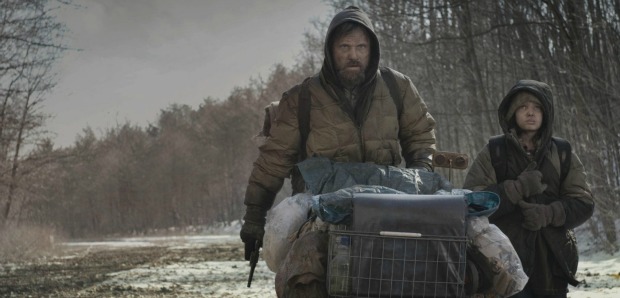The Road
Any filmic adaptation of a loved and lauded novel inevitably draws intense scrutiny over its 'faithfulness' and rightly so; this, however, is arguably one of most impressive reincarnations I've ever seen.
Plot summary
A post-apocalyptic tale of a man and his son trying to survive by any means possible.

One of the most hotly anticipated films of the year, John Hillcoat, along with the indispensable help of accomplished screenwriter Joe Penhall reconstruct Cormac McCarthy’s Pulitzer Prize winning novel, The Road, into one of the most beautifully harrowing films of the decade.
Anyone who has read this tremendously moving and thoroughly traumatic dystopia will know with proud familiarity its singularly distinctive and exquisitely barren prose. Like its decimated, ashen landscapes, McCarthy’s laconic style paints a brutally bleak picture of a near future in which no animals live, expired trees stud the moribund landscape and cannibalistic scavengers stalk the ravished countryside hunting for human flesh. Hillcoat renders this nightmarish vision of America onto the big screen with imposing virtuosity; the visual residue left by my reading of the novel correlates with the aesthetic of the film with almost supernatural indistinguishability. A pervasive smoggy, grey shrouds everything in this film; it looks heart-stoppingly stunning, as it does when being read. Any filmic adaptation of a loved and lauded novel inevitably draws intense scrutiny over its ‘faithfulness’ and rightly so; this, however, is arguably one of most impressive reincarnations I’ve ever seen.
Essentially a two-hander, the Man and his son (neither are given names), who stoically traverse the barbarous and desolate wastes of the Eastern Seaboard fighting at all costs to remain alive without resorting to savagery and malice, are played magnificently by Viggo Mortensen and the ridiculously named but gallingly talented Kodi Smit-McPhee, only ten years of age. The mantle of the story rests solely on their relationship. Each of them are all one another has in the world, the Man nourishing his perishing child with not only a raw survival instinct, but with a searing necessity that even in the face of the most heinous evil, benevolence and empathy – two things long extinct – are paramount.
Mortensen – an intriguing man, serene and philosophical – spoke during our interview with such tender sincerity about the two characters and their unremitting and inexpressibly vital bond that it seems clear that he has invested a large but vulnerable part of his soul into his performance. I don’t care that this sounds indulgent because there is something about this film, this novel, something so pure, so intrinsically human that forces one to shove aside smart-arsed scepticism and just marvel – humbled – at so crucial and compelling a message.
With a few minor necessary trimmings, the narrative is exactly the same as McCarthy’s. The one notable exception is scriptwriter Penhall’s decision to expand and enrich the largely uncharted character of the Man’s wife and Boy’s mother played here, fleetingly, by Charlize Theron. This woman who leaves the other two in favour of suicidal abandon appears in the novel – in Penhall’s own words – as ‘a bit of a nutter’, whereas Hillcoat fashions a far more human and engaging character. With measured restraint, he dapples brief and extremely moving cross-cuts of pre-shite life – startlingly colourful snatches of their romantic past, tender scenes of a sleeping Theron being stroked protectively by the endlessly compassionate Mortensen. This fleshing-out so to speak lends so much extra poignancy when their eventual parting arrives.
I could write for pages about why this film is so good but I would far rather expend the energy in urging people to buy the book, consume it, and then watch this. Haunting, intensely beautiful and unbelievably sad, this is a truly accomplished piece of work. A cathartic release like no other.










COMMENTS